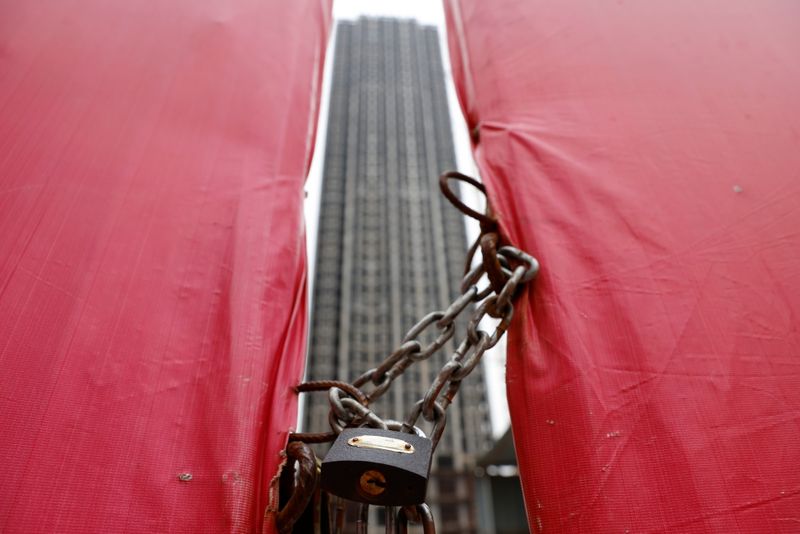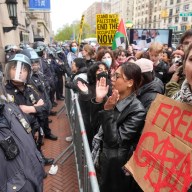HONG KONG (Reuters) – Worries about the fate of beleaguered developer China Evergrande Group have rattled markets around the world, and investors are looking for possible intervention by Beijing to stem any domino effects across the global economy.[L1N2QN02R]
Here are some highlights of what analysts have been saying about the cash-strapped company and the risks to the financial system in the event Evergrande collapses. All comments are from research reports published this week.
JPMORGAN
“Without a doubt, the company’s overleveraged balance sheet made it vulnerable, but the fast deterioration has been accelerated by the government’s policies, i.e. the three red lines imposed on developers and the property lending limit imposed on banks.”
“These have led to a liquidity squeeze for the whole sector and not just for Evergrande. Several weaker developers that have some near-term refinancing needs are already showing signs of distress with their bonds now trading at 50-60. Indeed, we could potentially see 11 defaults totaling $30 billion (or 23% default rate for the sector) this year, based on our estimates.”
JPMorgan did not mention the potential defaulters by name.
Barclays Capital
“We have been asked repeatedly in recent weeks if ‘this’ – a likely Evergrande default – is China’s Lehman moment.
“Not even close, in our opinion. Yes, Evergrande is a large property firm. And yes, there could (probably will) be spill-over effects on China’s property sector, with economic implications. And yes, it comes at a time when China’s growth has already started to disappoint.
“But a true ‘Lehman moment’ is a crisis of a very different magnitude. One would need to see a lenders’ strike across large parts of the financial system, a sharp increase in credit distress away from the real-estate sector, and banks being unwilling to face each other in the interbank funding market.”
UBS
“We think it is difficult for Evergrande to meet its liabilities. Project delivery will be the most important from social stability point of view, hence home buyers and suppliers are the most important stakeholders.”
A possible scenario is “segregating project companies from the group to ensure the asset value is materialized and the cash flow is used for project construction only”
“We expect a debt restructuring with a haircut will be needed.”
BNP PARIBAS
“We estimate less than USD50bn of Evergrande’s USD300bn outstanding debt is financed by bank loans. … Suggesting the Chinese banking sector will have a sufficient buffer to absorb potential bad debts.”
“Over the past week, however, investors have become increasingly worried about the contagion risks to supply chains (commodities), social stability (construction workers, homebuyers), and credit stress (de-risking on Chinese high yield bonds), as the central government has been relatively muted on the Evergrande situation.”
CITI
An Evergrande default and its effect on China’s banking sector presents “a potential systemic risk to China’s financial system” since approximately 41% of the banking system’s assets were either directly or indirectly associated with the property sector as of end-2020.
“We do not see the Evergrande crisis as China’s Lehman moment” because policymakers will likely prevent systematic risk “to buy time for resolving the debt, and push forward marginal easing for the overall credit environment.”
ING
Restructuring Evergrande “will not be a simple task (as) Evergrande is not a simple corporate.”
Complexities for the restructuring include a bank under a subsidiary of Evergrande, a pharmaceutical company, and an expressway company that Evergrande has invested in – all of these in China’s eastern Shandong province.
“China’s authorities will need to look at how this bank is related to other financial institutions to avoid a liquidity crunch in Shandong and among smaller banks.”
S&P GLOBAL RATINGS
The Evergrande situation “could broadly rattle investors’ confidence in China’s property sector and, for speculative grade markets more broadly, possibly diminish funding access for unrelated names”
“Evergrande’s difficulties are also weighing on China’s property market. This could have wide-reaching negative ramifications for other developers, suppliers and contractors, and the banks and financial institutions that lend to them.”
CAPITAL ECONOMICS
“What happens next comes down to how policymakers choose to handle the situation. The struggles of Evergrande and other developers are in large part the result of tightening restrictions as the authorities try to curtail some of the past excesses in the property sector.”
“That suggests to us that while both equity and bond holders probably face further pain, the authorities will ensure that households exposed to Evergrande -and other struggling developers- are made whole, limiting the wider economic damage.”
BANK OF SINGAPORE
“While we would not be surprised by heightened volatility as the market grapples with uncertainty regarding the resolution of Evergrande’s situation, and as investors weigh the risks of government intervention coming in too late to contain widespread contagion effects, our base case is that the risk of an economic crisis in China due to Evergrande is limited at this time.”
(Compiled by Alun John in Hong Kong and and Marc Jones in London; Editing by Shri Navaratnam and Emelia Sithole-Matarise)



















